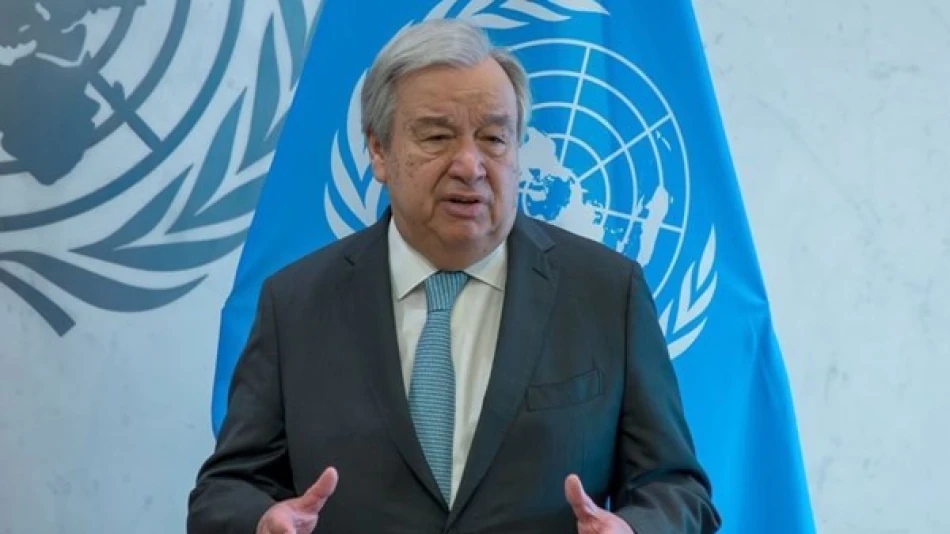
UN Chief Voices Concern Over Israeli Drone Attacks Targeting UNIFIL Forces
Israeli Drone Attack on UN Peacekeepers Marks Dangerous Escalation in Southern Lebanon
UN Secretary-General António Guterres has condemned a targeted Israeli drone strike on UNIFIL peacekeeping forces in southern Lebanon, calling it one of the most serious violations since November's ceasefire agreement. The attack, which saw Israeli drones drop grenades within 20 meters of UN personnel, represents a dangerous precedent that could undermine the fragile stability along the Lebanese-Israeli border and challenge the authority of international peacekeeping operations.
The Attack: Precision Strike Despite Prior Coordination
According to UN spokesperson Stéphane Dujarric, Israeli drones deliberately targeted UNIFIL forces conducting routine field operations near the town of Marwahin on Tuesday. The peacekeepers were engaged in clearing obstacles that blocked access to a UN position—work that had been pre-coordinated with Israeli military authorities.
Four grenades were dropped in the immediate vicinity of UN personnel and vehicles, with one explosive landing just 20 meters from the peacekeeping team. The proximity of the strike forced an immediate suspension of operations, highlighting the calculated nature of what appears to be an intimidation tactic rather than accidental fire.
Breaking Point for UN-Israel Relations
Violation of International Law
UNIFIL has characterized this incident as one of the most serious attacks since the November ceasefire took effect, representing a grave violation of UN Security Council Resolution 1701 and international law. The resolution, adopted in 2006, established UNIFIL's enhanced mandate to monitor the cessation of hostilities between Israel and Hezbollah.
The timing is particularly significant given that the Security Council recently extended UNIFIL's mandate until December 31, 2026, demonstrating continued international commitment to the mission despite mounting challenges.
Pattern of Escalation
This attack follows a troubling pattern of Israeli actions against international observers in the region. Similar incidents have occurred with other UN positions, suggesting a deliberate strategy to limit international monitoring capabilities along the border. The fact that Israeli forces were notified in advance makes this incident particularly egregious, as it demonstrates a conscious decision to target coordinated peacekeeping activities.
Strategic Implications for Regional Stability
The attack on UNIFIL forces represents more than just a bilateral issue between Israel and the UN—it threatens the entire framework of international peacekeeping in one of the world's most volatile regions. If international forces cannot operate safely with prior coordination, the effectiveness of peacekeeping missions globally comes into question.
For regional stability, this incident could signal Israel's growing impatience with international oversight of its southern border operations. The November ceasefire agreement relies heavily on UNIFIL's monitoring role, and any degradation of the mission's operational capacity could create a security vacuum that both Israel and Hezbollah might seek to exploit.
International Response and Consequences
Guterres' strong condemnation reflects broader international concern about Israel's increasingly aggressive posture toward UN operations. Unlike previous incidents that could be dismissed as accidents or misunderstandings, the pre-coordinated nature of Tuesday's operation makes plausible deniability impossible.
The incident is likely to resurface longstanding debates within the Security Council about Israel's compliance with international law and the protection of UN personnel. Countries contributing troops to UNIFIL may demand stronger security guarantees or consider withdrawing their forces if such attacks continue.
This escalation also complicates broader diplomatic efforts to maintain stability in Lebanon, where economic crisis and political fragmentation have already created significant challenges for international engagement. A weakened or withdrawn UNIFIL presence would likely accelerate regional instability, potentially drawing in other actors and threatening the November ceasefire arrangement.
Most Viewed News

 Layla Al Mansoori
Layla Al Mansoori






